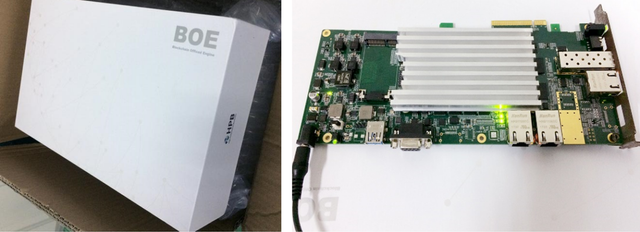The HPB BOE Acceleration hardware, what it means for Crypto

In the past year, I've heard of hundreds of smart engineers, developers and even mathematicians throw out a number of great theories that could improve scalability on the large scale that cryptocurrency will need to handle becoming a true worldwide currency. Let alone a worldwide smart contract based supercomputer that many thought Gen 1 and Gen 2 blockchains would bring us. The latest idea of sharding is probably the leading push from most blockchains to increase real-world throughput and while everyone agrees it will work, throughput will still be bottlenecked at the shard level, and that's where I think HPB is smart in realizing that sharding, at least sharding alone won't be what solves the throughput conundrum for blockchains.
With some second and third generation blockchains getting into the 10,000-50,000 tps targets, already a huge improvement over the first gen blockchains like bitcoin that topped out at 7-20tps, most blockchain companies see that as enough. The thought behind the idea that lightning and it's counterparts ability to provide 10,000 to 50,000 tps being enough, lies in numbers from leading fiat processing platforms. If blockchain can directly compete with their transactions per second obviously that's good enough, right? The problem with that train of thought is that blockchain isn't meant to be just another visa or mastercard processing platform, or at least most blockchains don't claim to be ONLY that.
Blockchains especially smart chains in the longterm have to scale to handle both global financial implications like fiat processors, but also have to handle the implications of dAPP logic processing as well, which means they will need to handle orders of magnitude more processing than existing fiat processors. We as an industry don't have to match aging fiat processors we have to look for ways to surpass them in every conceivable way to truly be seen as a viable alternative.

The team behind HPB think that to really solve the throughput issue something more than just software is needed, as you can see above the first of the BOE Accelerator boards are the answer HPB have for the problem. HPB want to take the problem head-on as their primary goal by offering a way to truly scale up processing power, and give decentralized nodes the hardware tools to process transactions for both currency and dAPPs at a rate that was though unheard of in the past. The best part of having a hardware-based solution is that it doesn't forgo the ability for the network to implement all the latest blockchain and mathematical features that are developed in the industry, what it does is offer a new piece of tech to truly offer a way to scale up almost infinitely.
With the recent node selection phase coming to a close in July the team's massive response from node applicants seems to hint that I'm not the only one that believes a hardware solution, is the right solution to scaling in the future. Time will tell if the teams hardware will continue to be the best choice, but what's obvious is it can't hurt. Even if the team decides that sharding is important even with their million TPS hardware-accelerated network, the fact they have hardware accelerators doesn't preclude the developers of HPB from implementing whatever smart minds in the blockchain industry come up with. What the hardware does offer is a major leg up on the competition, especially since no other network to my knowledge has even attempted to release dedicated hardware accelrators for their blockchains, so HPB is in a field of it's own when it comes to capabilities.
I'm excited to monitor HPB and see just what kind of performance we really see not just at launch but over time as they continue to tweak not only their hardware but their software. With more metaphorical knobs to twist and tune than any other network, HPB is charting new ground in what performance could be. For more information and to see why I'm so enthusiastic on what could be, check out the team's website and social media to really get a feel for whats possible.
I'm a big fan of marrying the combination of hardware and software to achieve better results!
It's truly magically how this combination can work. When we buy new smartphones we get a raise of performance. But also with getting new software updates we often get even more gaining of performance.